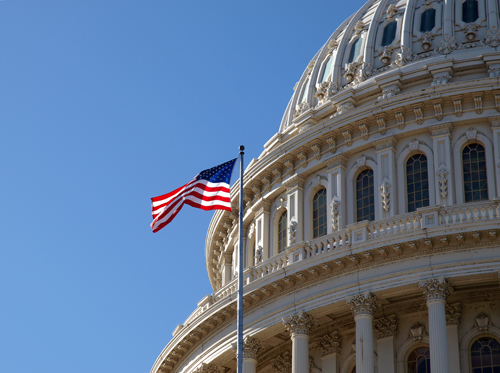
Here is a quick run down of major issues being discussed by policymakers from an endocrine perspective and the Society’s current advocacy work. Let us know if you would like additional information or have any questions.
What’s Happening in Washington
Shutdown to end all shutdowns? Washington went back to work this week after President Trump and the Congress agreed to a three-week Continuing Resolution to reopen those agencies and departments that have been shuttered by the partial government shutdown. The State of the Union has been rescheduled for February 5. Congress and President Trump have until February 15 to strike a deal on the boarder wall or we will see another shutdown. We hope Washington lawmakers feel the love on Valentine’s Day, so this doesn’t happen all over again.
Some lawmakers are now calling for legislation to end shutdowns. Members of both parties say it is past time to enact legislation that would require automatic Continuing Resolutions. The problem with this strategy, however, is that if we remove the approach of holding their feet to the fire, we are likely to see less effort to pass real spending bills with increases. Meanwhile, Senator Lindsey Graham (R-SC) is urging President Trump to push for an increase in the national debt limit as part of the final FY 2019 legislative package to pressure Democrats to yield on funding for the border wall. This also would be a dangerous strategy as the current political climate doesn’t bode well for the hope of lawmakers and the White House to agree to a debt limit deal, which could result in Congress finding itself in a second stalemate.
Earmarks on the Horizon – House and Senate aides from both parties predict there will be a serious push to bring back “earmarks” once the government shutdown uncertainty has ended. There has been a ban on earmarks since 2010 when Republicans took control of the House of Representatives.
Insulin Pricing – Representatives Diana DeGette (D-CO) and Frank Pallone, Jr. (D-NJ), two of the top Democrats on the House Energy and Commerce Committee, sent letters to the heads of Eli Lilly, Novo Nordisk and Sanofi – three manufacturers of insulin in the US – asking them to explain the rapidly increasing cost of the drug and why they are not providing a more affordable treatment to patients in need.
Health Hearings Galore – This week we saw multiple congressional hearings on both sides of the Capitol focused on health issues:
- The House Ways and Means Committee conducted a hearing on the Affordable Care Act’s protections for individuals with pre-existing conditions.
- The House Oversight and Reform Committee conducted a hearing on how drug companies have increased prices.
- The Senate Finance Committee conducted a hearing on drug pricing that featured the mother of a child with insulin-dependent diabetes.
- The Senate Health, Education, Labor and Pension Committee conducted a hearing about health access in underserved communities.
We expect additional hearings on these topics in the coming months as well as the introduction of legislation to address these issues. We will work with congressional offices to share our position statement on increasing insulin affordability, our recommendations, and to influence legislation.
The new United States 116th Congress was sworn in on January 3, 2019. A new Congress presents an extraordinary opportunity for you to contact the new members of the Senate and the House of Representatives, offer your expertise as endocrinologists and/or researchers, and share what issues you and the Endocrine Society find important.
Join our campaign and welcome your new member of Congress today!
If you have any trouble navigating our advocacy software, please refer to our Contact Congress guide.
What We Are Working On:
EDCs – We are co-sponsoring with the Environmental Working Group a congressional briefing Wednesday, February 6, on Endocrine Disrupting Chemicals in Cosmetics. Endocrine Society member Leo Trasande will discuss the health risks posed by EDCs in personal care products.
Researcher Hill Day – We are preparing for a Researcher Hill Day on February 28. Attendees include members of APOCC, RACC, Council, and FLARE. We will visit congressional offices to recommend a $2.5 billion increase for the National Institutes of Health in FY 2020 and reauthorization of the Special Diabetes Program.
Drug Pricing – Health and Human Services Secretary Alex Azar and Inspector General Daniel Levinson proposed a rule to lower prescription drug prices and out-of-pocket costs by encouraging manufacturers to pass discounts directly to patients and bringing new transparency to prescription drug markets. We are reviewing the proposed rule and developing a response. We are also planning a meeting at the end of the month with Director of Drug Pricing Reform John O’Brien.
Science Policy – We sent a welcome letter to Kelvin Droegemeier who was recently confirmed to head the White House Office of Science and Technology Policy (OSTP). We shared our policies and positions related to federal funding of biomedical research, regulatory burdens in research, EDCs, publishing and peer review, and standardization of hormone assays. Dr. Droegemeier was confirmed by the Senate January 2, but could not start his job until after the shutdown as White House staff were furloughed. He has received bipartisan backing and has stated that his areas of focus will be coordinating the federal research and development portfolio, helping produce a diverse STEM workforce, and supporting new models for public-private partnerships that can translate research into the marketplace.
Women’s Health – ES staff met with Representative David Scott’s (D-GA) office about PCOS. Representative Scott plans to introduce a resolution focused on the need for more research in PCOS, which we will promote during our upcoming Researcher Hill Day.


